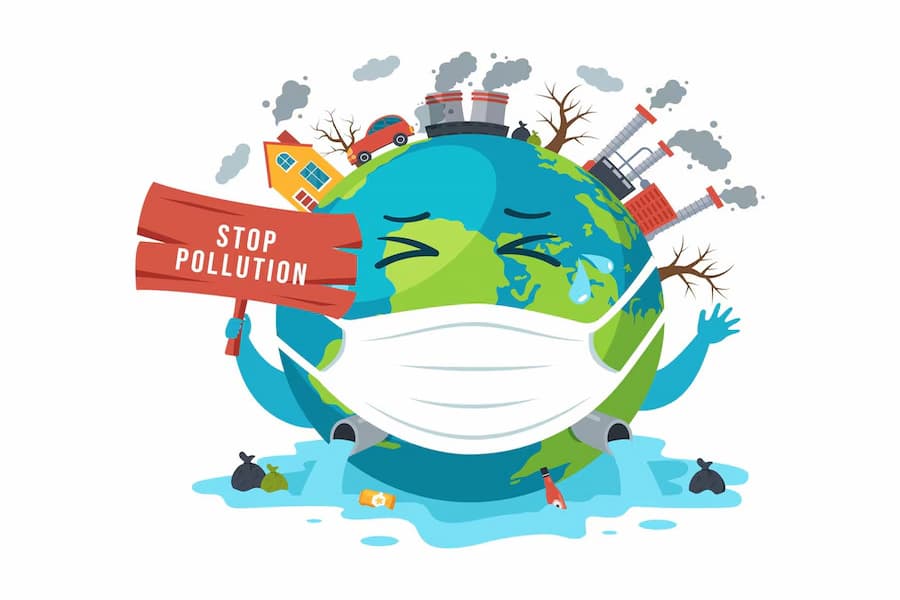Introduction
Pollution is one of the biggest environmental concerns facing the world today. It influences our water, the air we breathe, and the ground we depend on for food and cover. From plastic waste and chemical runoff to industrial emissions and car exhaust, dirtiness occurs in various forms and it seriously jeopardises human health and ecosystems. Here we will discuss some effective strategies for pollution prevention.
Effective Pollution Prevention Strategies
Reducing Land Pollution
Waste accumulation, deforestation, mining, and industry operations all lead to land contamination. Unchecked land pollution damages ecosystems as well as accelerates climate change and reduces biodiversity.
Reducing trash at the source is one of the most efficient approaches to preventing land pollution. Reducing, reusing, and recycling help lower landfill waste—the 3Rs. Using reusable shopping bags, composting food waste, and material reuse are among sustainable habits households and companies may embrace.
Furthermore, proper garbage disposal is crucial. Specialised recycling systems should handle hazardous products such as batteries, electronics, and chemicals. Strict environmental regulations and community awareness campaigns should help reduce illegal dumping and littering. Seeking help from skip hires, such as Mancunian skip hire, is also necessary for effective waste disposal.
Reducing Air Pollution
Harmful emissions from businesses, power plants, automobiles, and homes all contribute to air pollution. Limiting the emission of harmful gases, particulate matter, and greenhouse gases into the atmosphere is absolutely essential to preventing air pollution.
Changing to renewable energy sources is among the best strategies available to lower air pollution. Major causes of air dirtiness, fossil fuels are less relied upon with solar, wind, and hydroelectric power. Phase-out of coal and oil-based power plants and investments in renewable energy projects by governments and companies should be priorities.
Encouragement of energy efficiency is also rather important. Smart home technologies, LED lighting, and energy-efficient appliances help to cut emissions from power generation and energy usage. To further reduce air dirtiness, businesses can also embrace greener production methods including low-emission fuels and contemporary filtering systems.
Managing Water Pollution
When dangerous materials like chemicals, plastics, and industrial waste enter rivers, lakes, and seas, water dirtiness results. Protection of aquatic ecosystems and public health depends on preventing water pollution.
Reducing plastic trash is among the most successful methods of preventing water contamination. Many times ending up in water bodies, single-use plastics including bottles, straws, and packaging damage aquatic life. Plastic pollution can be avoided via bans on plastic bags, support of biodegradable substitutes, and recycling campaigns.
Implementing Sustainable Industrial Practices
Because they depend so much on raw materials, energy, and dangerous chemicals, industries are among the biggest pollers of the earth. Industries have to use waste management systems and ecologically friendly manufacturing techniques if they want to prevent dirtiness.
Green manufacturing—which emphasises on lowering waste, energy usage, and emissions—is among the most sensible fixes available. Minimising industrial dirtiness requires using renewable energy sources, energy-efficient technology, and non-toxic raw materials.
Another approach is implementing ideas of the circular economy. Materials should be recycled and used differently to produce fresh goods rather than thrown away following use. This lessens pollution by lowering the demand for fresh raw materials and hence trash.
Promoting Eco-Friendly Transportation
Major causes of noise, greenhouse gas emissions, and air pollution are transportation. Reducing carbon footprints and dirtiness depend on the change towards sustainable transportation.
Encouragement of public transport is among the better answers. Reduced individual vehicle count on the road by trains, buses, and subways helps to minimise dirtiness. Funding high-speed trains and electric buses can help public transport be even more ecologically benign.
By building safe sidewalks and bike lanes, cities can also support walking and riding. This advances better living as well as lessens pollution.
Encouraging Green Urban Planning
Urban pollution has grown to be a main environmental issue as cities develop. Bad urban design results in traffic congestion, industrial emissions, and waste management problems all of which add to dirtiness.
Emphasising sustainable growth, green urban design guarantees that cities expand in an ecologically friendly manner. This covers developing energy-efficient structures, extending green areas, and enhancing waste-management systems.
Urban woods, vertical gardens, and green rooftops assist cities’ temperatures be regulated, air pollution be lowered, and carbon dioxide absorbed. Establishing environmentally friendly public areas also advances sustainability and improves resident quality of living.
Raising Public Awareness and Education
Preventing pollution requires public involvement. Unaware of it, people and companies could unintentionally cause environmental harm.
Community projects and educational campaigns aim to raise knowledge about methods of dirtiness prevention. Environmental education should be included into school curricula so that students could learn about sustainable living and conservation initiatives.
Public campaigns and social media can also be very effective strategies for encouraging environmentally friendly behaviours such cutting plastic consumption, energy conservation, and tree planting.
Conclusion
Preventing pollution requires both individuals, businesses as well as government action. Reducing emissions, cutting waste, implementing green technologies, and supporting sustainable living will help to produce a better and healthier earth. Making deliberate decisions that give environmental preservation top priority will help to prevent pollution.
Visit Trendblogs for more informative blogs.


